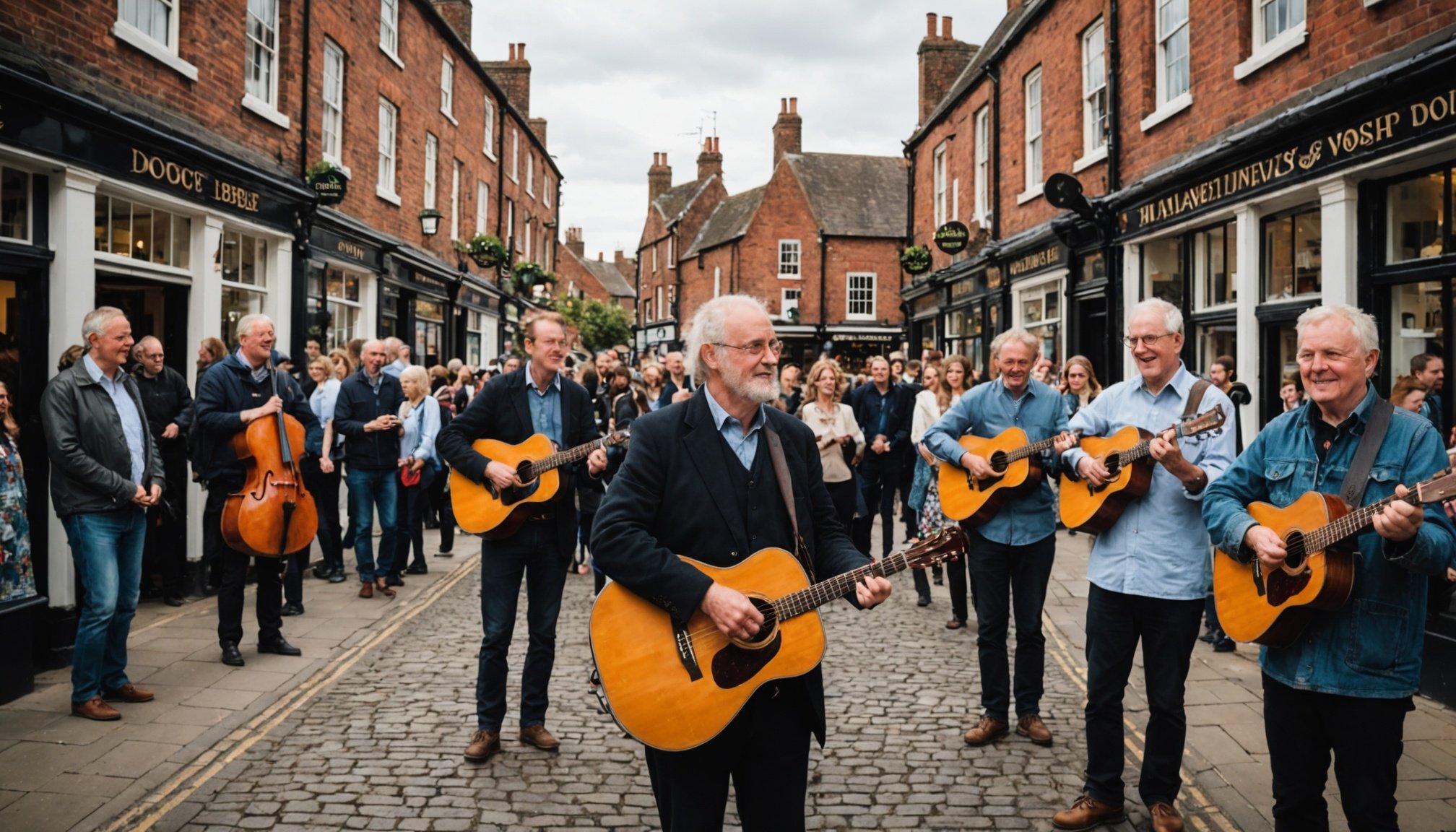Best Venues for UK Folk Music
Folk music venues in the UK are synonymous with rich traditions and vibrant performances. These venues are more than just places; they are hubs nurturing authentic folk music. From intimate pubs to grand stages, each offers a unique taste of the folk heritage.
Take, for example, Cecil Sharp House in London. Known for its notable performances, it has welcomed renowned artists like Martin Carthy and Eliza Carthy. The atmosphere here is electric, making it a must-visit for those hungry for a live folk music experience. Another iconic spot is The Green Note, famed for its eclectic mix of emerging talent and celebrated names.
Additional reading : Discover Cornwall”s Top Coastal Towns for Uncovering Historic Smuggling Trails
For a more traditional experience, head to The Red Lion Folk Club in Birmingham. The intimate setting fosters audience engagement, inviting visitors to lose themselves in the melodies.
These venues don’t just host gigs; they create a sense of community. Audiences participate enthusiastically, singing along and even joining in dances. Such interactions make every performance memorable, offering attendees not only music but a slice of UK’s cultural artistry. Whether you’re a long-time folk aficionado or a newcomer, immersing yourself in these spaces is a journey through the soul of UK’s folk music scene.
Also read : Discover Yorkshire”s Hidden Gems: The Ultimate Guide to Authentic British Fish and Chip Shops!
Popular Folk Music Festivals
Folk music festivals in the UK are celebrated for their rich cultural heritage and dynamic performances. They offer an incredible opportunity to experience the diversity of traditional melodies, dance, and crafts. These festivals serve as cultural mosaics, welcoming both enthusiasts and newcomers into the heart of British traditions.
Festival Highlights
Attending folk music festivals UK can be an unforgettable experience. Highlights often include vibrant parades, workshops, and interactive sessions where traditional instruments are demonstrated. Visitors can enjoy:
- Live performances by renowned folk bands.
- Opportunities to learn folk dances.
- Exhibits showcasing local craftsmanship.
Festivals such as the Cambridge Folk Festival and Sidmouth Folk Week are esteemed for their extensive line-ups and unique community experiences.
Key Artists Featured
Renowned artists grace these folk music events, elevating their status. Traditional music festivals in the UK often feature both legendary and emerging talents, offering an eclectic mix of folk styles. Performers frequently collaborate, bringing unique sounds and fresh takes on classic tunes.
Cultural Aspects of the Festivals
These festivals go beyond music by embedding cultural aspects into every element. From the historical sites hosting the events to the storytelling sessions that uncover folklore, each festival is a gateway into the UK’s past and present. This storytelling enriches visitors’ understanding and appreciation of the region’s multicultural backdrop.
Local Folk Music Communities
In the heart of the folk music community in the UK, local folk music groups are the lifeblood that keeps traditions vibrant. These grassroots folk music gatherings play a crucial role in preserving the rich tapestry of regional tunes and cultural narratives. But why are these communities so important?
The answer lies in their unique activities and events. Local folk groups organise gatherings that range from informal jam sessions to structured performances. This creates a platform for musicians to share and learn, nurturing a sense of belonging. These events are often the backbone of a thriving folk culture, allowing enthusiasts to engage with music at a grassroots level.
Within these communities, personal stories emerge as members share experiences and memories tied to the music. Such narratives highlight the emotional connection and cultural significance that folk songs carry. A member from a local folk group might recall the feeling of unity during a communal singalong or the pride of passing down a family tune.
By preserving these intimate traditions, local folk clubs ensure that folk music remains a living, breathing art form. They foster environments where old traditions are cherished and new ones are born, allowing for continued cultural resilience and creativity.
Historical Context of Folk Music in the UK
The history of folk music in the UK offers a rich tapestry woven from cultural influences and traditions that date back centuries. Folk music, deeply rooted in the everyday lives of the people, served as both a means of storytelling and a vehicle for social commentary.
Origins and Development
Folk music in the UK can trace its cultural influence back to medieval times, drawing from Celtic, Anglo-Saxon, and Norse traditions. These early roots laid the groundwork for a genre that was not only about entertainment but also preserving history and customs.
Key Historical Figures
As the genre evolved, notable figures emerged, leaving a lasting impact on the evolution of folk music. Artists such as Cecil Sharp and Ewan MacColl played pivotal roles in collecting and reviving ancient folk songs, ensuring they remained part of the contemporary musical landscape. They influenced new generations to embrace and reinterpret traditional tunes through modern sensibilities.
Evolution of Instruments and Styles
Over time, the introduction and adaptation of instruments and style variations have significantly marked the history of folk music. Instruments like the guitar, fiddle, and accordion became staples, each contributing to the sound’s evolution. Changing societal dynamics also influenced styles, leading from traditional ballads to more contemporary folk-rock fusions. The folk music tradition in the UK showcases its enduring cultural influence while continuously adapting to the modern era.
Engaging with Folk Music
Engaging with folk music provides a rich cultural experience that combines heartfelt tunes with communal appreciation. To enhance your folk music engagement, consider these practical tips.
When attending live performances or festivals, arrive early to secure a good spot. This not only ensures a better view and sound quality but also offers opportunities to engage with fellow enthusiasts. Check the event’s schedule and highlight artists you’re eager to see, which can help prioritize your time, especially at larger festivals.
Interacting with musicians and fans at folk music venues can deepen the experience. Musicians often appreciate genuine feedback, so don’t hesitate to express your enjoyment of their performance. Engaging in conversation can provide insights into their creative process or the stories behind their songs. Fellow fans can also be a great resource for discovering new artists or upcoming events.
To discover local folk music events, explore online resources like regional music forums or websites dedicated to folk festivals. Social media groups focused on folk music can also offer updates on nearby gatherings.
- Arrive early for better views and sound quality
- Engage musicians with thoughtful questions or feedback
- Utilize online platforms to find local gatherings
By following these tips for attending folk events, you can enjoy a more enriched and interactive experience with folk music.
















